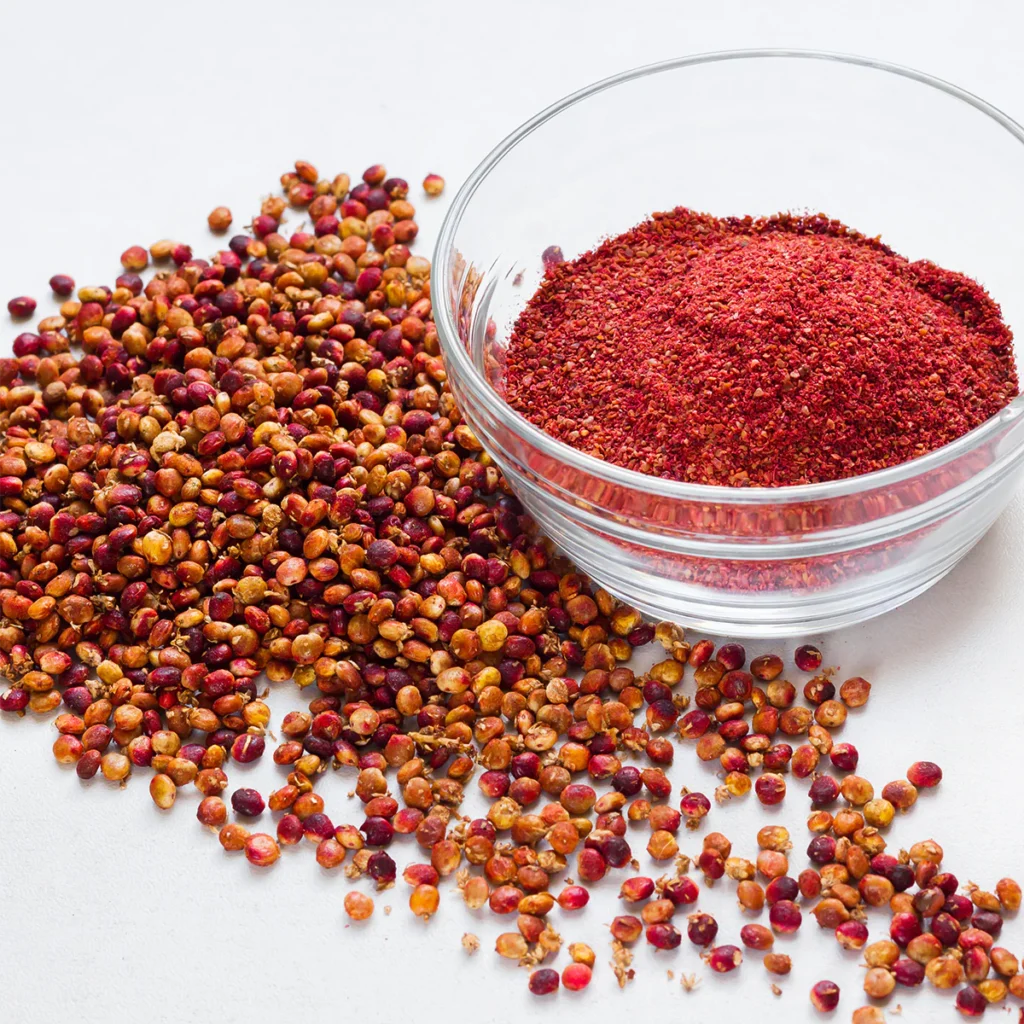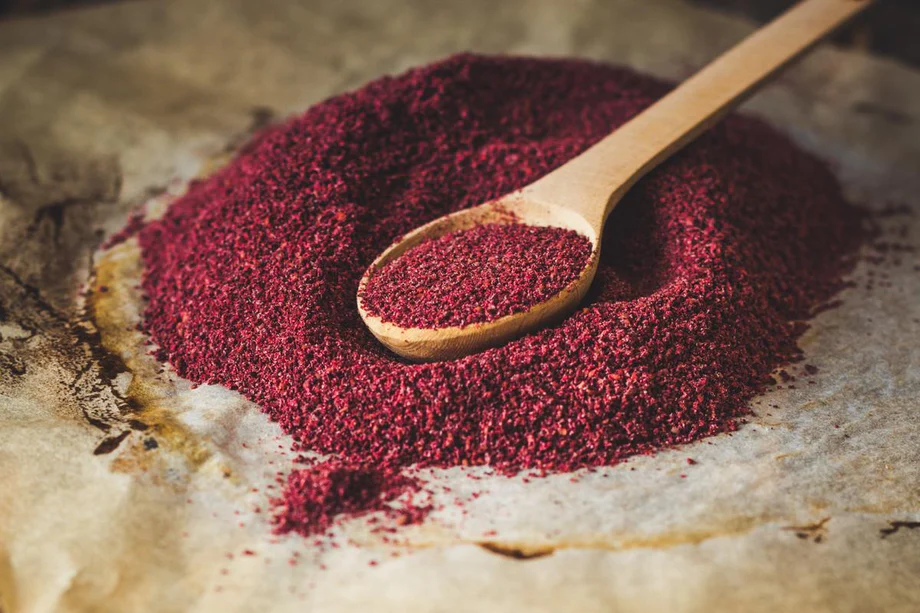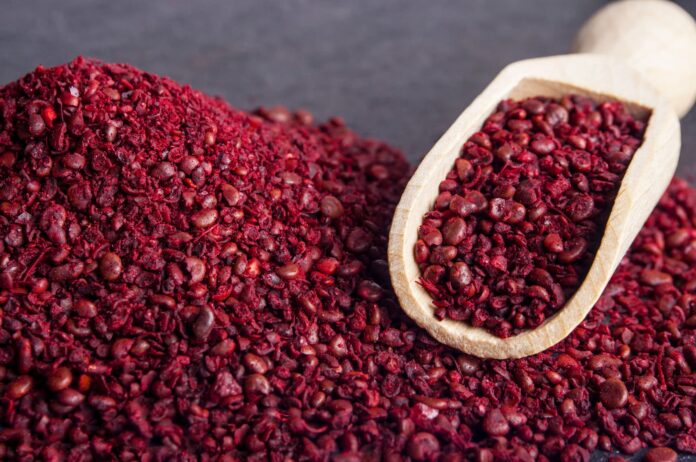INTRODUCTION:
Sumac is a tangy, crimson-colored spice made from the dried and ground berries of the sumac shrub (Rhus coriaria). A staple in Middle Eastern and Mediterranean cuisine, it adds a distinct lemony, earthy, and slightly smoky flavor to dishes. It is a versatile seasoning that can be used in rubs, dressings, and dips, and is a key component of the popular spice blend za’atar. Sumac is prized for its bright, acidic flavor, which is often compared to lemons or vinegar but is less sharply sour. Its complex profile also contains notes that are sweet, earthy, and mildly astringent.

English: Sumac, Sicilian sumac
Arabic: السماق (Al-Sumaq)
Hebrew: רֹתֶם (Rotem) or סומק (Sumak)
Turkish: Sumak
Greek: Ροσμαρίνα (Rosmarina) or Σουμάκι (Soumaki)
Italian: Sommaco
French: Sumac vinaigrier
Persian (Farsi): سماق (Somaq)
Urdu: سماق دانہ (Sumaq)
Hindi: सुमाक (Sumak) or सुमाक के फल (Sumak ke phal)
Armenian: Սումակ (Sumak)
HEALTH BENEFITS:

Rich in antioxidants
Sumac is a concentrated source of powerful antioxidants, including tannins, flavonoids, and polyphenols, that help protect the body’s cells from damage caused by free radicals. A 2018 study reported that sumac’s antioxidant capacity is 50 times greater than that of vitamins C and E.
Fights inflammation
Sumac’s antioxidant compounds help neutralize free radicals and inhibit inflammatory cytokines, providing significant anti-inflammatory effects. This may benefit conditions such as arthritis and other chronic inflammatory issues.
Supports heart health
Some studies indicate that consuming sumac may have a positive effect on cardiovascular health. Benefits include:
Reduced cholesterol: Research has shown that sumac may help lower total cholesterol, bad LDL cholesterol, and triglycerides.
Regulated blood pressure: In people with dyslipidemia, sumac supplementation was associated with a significant reduction in systolic and diastolic blood pressure.
Helps manage blood sugar
Several studies suggest that sumac can help regulate blood sugar levels, particularly for people with type 2 diabetes. One three-month study found that a daily dose of sumac powder significantly decreased fasting blood sugar and improved overall blood sugar control.
Relieves muscle pain
Preliminary research suggests that sumac may help alleviate exercise-induced muscle pain. A 2016 study found that participants who consumed a sumac drink reported less muscle soreness after an aerobic exercise program, possibly due to its antioxidant effects.
Aids digestion
Rich in dietary fiber, sumac can promote healthy digestion and regular bowel movements. It has also been used traditionally to treat gastrointestinal issues such as stomach aches and diarrhea.
Acts as an antimicrobial
Sumac has demonstrated antibacterial and antifungal properties, making it useful against certain pathogens. Traditionally, it has been used to treat infections and wounds.
Weight management
Some research suggests sumac may support weight management by helping you feel full longer due to its fiber content.
SIDE EFFECTS:

Allergies:
If you are allergic to cashews or mangoes, you may also have an allergy to edible sumac because they are in the same plant family. Symptoms of an allergic reaction can include hives, itching, or swelling.
Blood sugar levels:
Studies show that sumac can help lower blood sugar, which may interact with diabetes medication. If you take medication to control blood sugar, consult a doctor before adding significant amounts of sumac to your diet.
Stomach upset:
Some individuals may experience mild digestive discomfort, such as stomach upset or diarrhea, when consuming sumac in large quantities.
Lung irritation:
Inhaling the smoke from burning poison sumac is extremely dangerous and can cause severe, potentially fatal lung irritation, coughing, and breathing difficulty.
HOW TO USE:

Sprinkle on salads
Add a pinch of sumac to salads like fattoush or even a simple cucumber and tomato salad for a fresh, citrusy kick.
Season grilled meats or fish
Rub sumac on chicken, lamb, or fish before grilling or roasting. It adds a nice tart flavor.
Mix into marinades
Combine sumac with olive oil, garlic, and herbs for a zesty marinade.
Use as a finishing spice
Sprinkle on hummus, yogurt dips, or roasted vegetables for a burst of flavor.
Add to rice or grain dishes
Stir sumac into cooked rice, quinoa, or couscous for extra zest.
Tips:
Sumac is acidic, so it can replace lemon juice or vinegar in many recipes.
Use it sparingly because its flavor is strong but pleasant.
Store in an airtight container away from light and heat.




